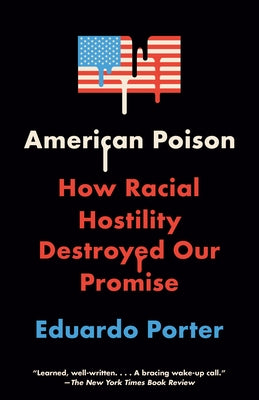Description
In American Poison, the New York Times veteran shows how racial animus has stunted the development of nearly every institution crucial for a healthy society, including organized labor, public education, and the social safety net. The consequences are profound and are only growing graver with time. Leading us through history and across America--from FDR's New Deal through Bill Clinton's welfare reform to Donald Trump's retrograde and divisive policies--Porter pieces together how racial hostility has blocked American social cohesion at every turn, producing a nation that fails not only its black and brown citizens but white Americans as well.
American Poison is at once a broad, rigorous argument, and a profound cri de coeur. Even as it uncovers our most tenacious national pathology, it points the way toward hope, illuminating the ways in which, as the nation becomes increasingly diverse, it may well be possible to construct a new understanding of racial identity--and a more cohesive society on top of it.
Author: Eduardo Porter
Publisher: Vintage
Published: 02/09/2021
Pages: 272
Binding Type: Paperback
Weight: 0.66lbs
Size: 8.00h x 5.10w x 0.90d
ISBN13: 9780525431930
ISBN10: 0525431934
BISAC Categories:
- Social Science | Ethnic Studies | General
- Social Science | Social Classes & Economic Disparity
- Social Science | Discrimination
About the Author
EDUARDO PORTER was born in Phoenix and grew up in the United States, Mexico, and Belgium. He is an economics reporter for The New York Times, where he was a member of the editorial board from 2007 to 2012 and the Economic Scene columnist from 2012 to 2018. He began his career in journalism as a financial reporter for Notimex, a Mexican news agency, in Mexico City. He was a correspondent in Tokyo and London, and in 1996 moved to São Paulo, Brazil, as editor of América Economía, a business magazine. In 2000, he went to work at The Wall Street Journal in Los Angeles to cover the growing Hispanic population. He is the author of The Price of Everything (2011), an exploration of the cost-benefit analyses that underpin human behaviors and institutions.

